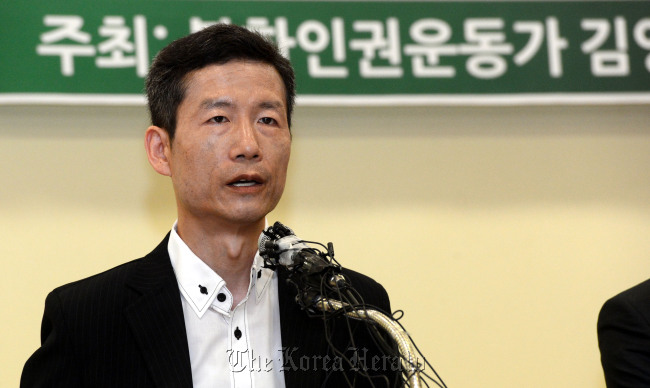Kim Young-hwan claims North Korea was involved in detention of four activists
North Korea was closely involved in China’s detention of four South Korean activists who campaigned for human rights in the communist country, one of them said Wednesday.
Kim Young-hwan also told a news conference that he was physically abused by Chinese investigators during interrogation and told not to disclose it.
Kim and three others arrived in Seoul on Friday after 114 days of confinement in China. They were arrested on March 29 and charged with “endangering national security.”
“I think North Korea is closely connected to this case,” he said.
 |
Kim Young-hwan, a North Korea human rights activist freed last week from detention in China, speaks at a news conference in downtown Seoul on Thursday. (Chung Hee-cho/The Korea Herald) |
One of the four detainees had been chased by China’s intelligence agency apparently at the request of North Korea, Kim said. He was arrested just after meeting the colleague.
He did not identify the main target of the investigation. The three others are Yoo Jae-gil, 43, Kang Shin-sam, 41, and Lee Sang-yong, 31.
“The Chinese did not tell me about the details but I believe there surely was cooperation (between China and North Korea),” he said.
The Chinese authorities initially told him that they were protecting him against possible abduction or terror from Pyongyang’s National Security Agency. He rejected that claim.
Kim accused Chinese officials of harsh treatment. He claimed that he was tortured and forced into 13 hours of daily labor.
Later in the day, the Foreign Ministry said it lodged a protest with China. After Kim told Korean consuls on June 11 about the abuses, the ministry summoned Chinese Ambassador to Seoul Zhang Xinsen.
On Monday, the ministry called in Zhang’s proxy Chen Hai to urge a speedy investigation.
“We requested a verification of his claims after the June meeting and said we are strongly protesting if it is true,” a senior ministry official told journalists.
Kim said he was given only a piece of steamed bun for every 10-minute meal time. That resulted in stomach trouble and 7 kilogram weight loss during the near four-month period, Kim said.
“(The severe treatment) was something that tormented me the most. I’ve never acted in a hostile way toward China. I have never carried out an anti-China movement or collected relevant intelligence,” he said.
But he never conceded to China’s demand for an acknowledgement of his wrongdoing or apology.
Ha Tae-keung, a former anti-North Korea activist and now a lawmaker of the ruling Saenuri Party, urged Beijing to offer an apology for its illegitimate incarceration and “inhumane” investigation process.
According to him, China’s national security violations can be applied to five types of activity ― threatening China’s sovereignty and the safety of its territory; by providing funds for a related group or individual; plotting, organizing or conducting national division; destruction of the national unification, armed rebellion or riot; or subversion of the government or communist system.
“Under the vague law, China can bring the same charges against you if you are on a business trip and pays locals for cooperation with reporting,” Ha told reporters at the event.
“Chinese attempted to invoke the clause for Kim and his colleagues’ project to compile information on human rights in North Korea with the help of residents there. It has overreached itself.”
During Kim’s detention, lawmakers and civic activists blasted the Chinese government for initially denying the four activists contact with consuls and consultation with attorneys.
Kim’s detention has drawn intense interest for his dramatic life. In the 1980s, he was a pro-North Korea movement leader playing a key role in disseminating the North’s s philosophy of “juche,” or self-reliance.
He transitioned to activism against the iron-fisted regime’s human rights abuses in the 1990s and is currently a senior researcher for the Seoul-based Network for North Korean Democracy and Human Rights.
By Shin Hyon-hee (
heeshin@heraldcorp.com)








